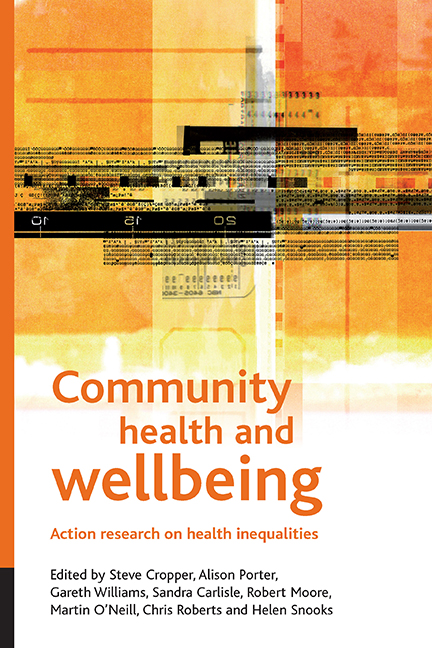Book contents
- Frontmatter
- Contents
- List of tables and figures
- Preface
- Acknowledgements
- Notes on contributors
- one Health inequalities in their place
- two ‘Policy experiments’: policy making, implementation and learning
- three Policy innovation to tackle health inequalities
- four Action research partnerships: contributing to evidence and intelligent change
- five Engaging with communities
- six The role of the community-based action researcher
- seven Evaluation, evidence and learning in community-based action research
- eight Social theory, social policy and sustainable communities
- nine Beyond the experimenting society
- Index
- SHARP DVD: A Way of Working Together to Improve Our Lives
three - Policy innovation to tackle health inequalities
Published online by Cambridge University Press: 15 September 2022
- Frontmatter
- Contents
- List of tables and figures
- Preface
- Acknowledgements
- Notes on contributors
- one Health inequalities in their place
- two ‘Policy experiments’: policy making, implementation and learning
- three Policy innovation to tackle health inequalities
- four Action research partnerships: contributing to evidence and intelligent change
- five Engaging with communities
- six The role of the community-based action researcher
- seven Evaluation, evidence and learning in community-based action research
- eight Social theory, social policy and sustainable communities
- nine Beyond the experimenting society
- Index
- SHARP DVD: A Way of Working Together to Improve Our Lives
Summary
Introduction
The first chapter of this book reviewed the large body of evidence that we have linking inequalities in health to social structure: a link that can be most crudely summarised by saying that poor people and people living in poor places tend to die younger and live unhealthier lives than richer populations in wealthier places. The health gradient across the social classes has remained over the past hundred years or so in Britain, despite overall improvements in both health and prosperity. We know a great deal about the associations between ill health and various factors: where you live, your wealth, your position in the social hierarchy, and the lingering effects that your position in the social hierarchy in childhood can have on your health in later life (Davey Smith and Gordon, 2000). Dahlgren and Whitehead's (1991) work on the underlying determinants of health and ill health has shown how individuals, communities and society as a whole form a nested and interacting ‘rainbow’ of influences. We have evidence of the way in which health is unequally distributed across income gradients and across geographical areas, in the form of epidemiology and in the form of personal testimony.
While there is general consensus that the social determinants of ill health can pile on top of one another to affect our bodies in complex and accumulative ways, there is less agreement about the mechanisms by which this happens and why particular people may be affected in particular ways. The majority of work on health inequalities in the UK has explored the causal link between absolute material deprivation and health inequalities; within this strand of research, an increasing body of work is exploring the resilience of certain deprived populations, and questioning how straightforward that causal link actually is (Mitchell and Backett-Milburn, 2006). A second school of thought, following the thinking of Richard Wilkinson (Wilkinson 1996, 2005; Stewart-Brown, 2000) emphasises the role played by relative deprivation, and argues that social and economic inequality within a state drags down the health of all, compared with those countries that are more equal.
Chapter Two argued that the relationship between a problem, a policy designed to address it and the implementation of that policy is a messy and complex one, and a subject worthy of study in its own right.
- Type
- Chapter
- Information
- Community Health and WellbeingAction Research on Health Inequalities, pp. 49 - 72Publisher: Bristol University PressPrint publication year: 2007



